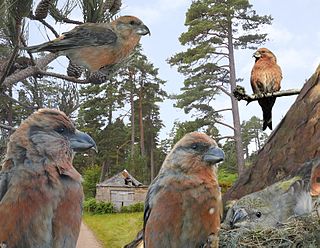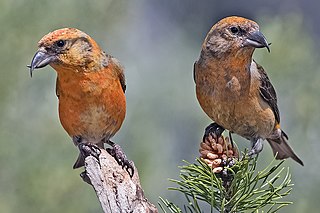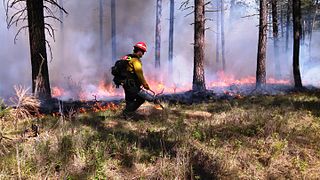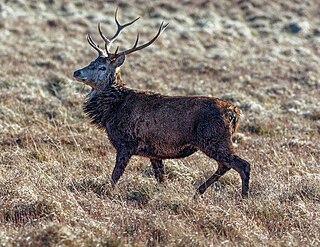Related Research Articles

Arbor Day is a secular day of observance in which individuals and groups are encouraged to plant trees. Today, many countries observe such a holiday. Though usually observed in the spring, the date varies, depending on climate and suitable planting season.

The Scottish crossbill is a small passerine bird in the finch family Fringillidae. It is endemic to the Caledonian Forests of Scotland, and is the only terrestrial vertebrate species endemic to the United Kingdom. The Scottish crossbill was confirmed as a unique species in August 2006, on the basis of having a distinctive bird song.

The red crossbill or common crossbill is a small passerine bird in the finch family Fringillidae. Crossbills have distinctive mandibles, crossed at the tips, which enable them to extract seeds from conifer cones and other fruits.

The Chequamegon–Nicolet National Forest is a 1,530,647-acre (6,194.31 km2) U.S. National Forest in northern Wisconsin in the United States. Due to logging in the early part of the 20th century, very little old growth forest remains. Some of the trees there were planted by the Civilian Conservation Corps in the 1930s. The national forest land trees and vegetation are part of the North Woods Ecoregion that prevails throughout the upper Great Lakes region.

A controlled or prescribed (Rx) burn, which can include hazard reduction burning, backfire, swailing or a burn-off, is a fire set intentionally for purposes of forest management, fire suppression, farming, prairie restoration or greenhouse gas abatement. A controlled burn may also refer to the intentional burning of slash and fuels through burn piles. Fire is a natural part of both forest and grassland ecology and controlled fire can be a tool for foresters.

The Bottom is the capital and largest town of the island of Saba, the Caribbean Netherlands. It is the first stop on the way from Saba's Port in Fort Bay towards the rest of the island. In 2001, it had 462 inhabitants of the total 1,349 islanders. It is the administrative center of Saba. It is the hometown of ESC Oxyo.

Ladder Bay is an anchorage on the leeward side of the Caribbean island of Saba. The bay sits on the west side of the island, directly under a set of 800 steps hand carved into the rocks locally known as "The Ladder". Until the construction of Saba's first pier in the 1970s, Ladder Bay was a primary point of entry for supplies to the island. An abandoned customs house sits on the lip of a cliff overlooking the bay.

The Caledonian Forest is the ancient (old-growth) temperate forest of Scotland. The forest today is a reduced-extent version of the pre-human-settlement forest, existing in several dozen remnant areas.

NatureServe, Inc. is a non-profit organization based in Arlington County, Virginia, US, that provides proprietary wildlife conservation-related data, tools, and services to private and government clients, partner organizations, and the public. NatureServe reports being "headquartered in Arlington, Virginia, with regional offices in four U.S. locations and in Canada." In calendar year 2011 they reported having 86 employees, 6 volunteers, and 15 independent officers.

Natural history of Scotland concerns the flora, fauna and mycota of Scotland.

The Hispaniolan crossbill is a crossbill that is endemic to the island of Hispaniola, and the only representative of the Loxia genus in the Caribbean.

Mount Scenery is a dormant volcano in the Caribbean Netherlands. Its lava dome forms the summit of the Saba island stratovolcano. At an elevation of 887 m (2,910 ft), it is the highest point in both the Kingdom of the Netherlands, and, since the dissolution of the Netherlands Antilles on 10 October 2010, the highest point in the Netherlands proper.

The Society of Fire Protection Engineers (SFPE) is a professional society for fire protection engineering established in 1950 and incorporated as an independent organization in 1971. It is the professional society representing those practicing the field of fire protection engineering. The Society has over 5,000 members and more than 120 chapters and over 20 student chapters worldwide. SFPE also includes the SFPE foundation with the following mission "Enhancing the scientific understanding of fire and its interaction with the social, natural and built environments".

The Cassia crossbill is a passerine bird in the family Fringillidae. It is endemic to the South Hills and Albion Mountains in southern Idaho. Cassia crossbill rarely interbreeds with other call types that move into the South Hills of Idaho yearly, and can be considered to represent a distinct species via ecological speciation. The Cassia crossbill have specialized beaks to access the seeds of the lodgepole pine cones in this region, but are poorly adapted to other pine cones in surrounding regions.

The European Centre for Nature Conservation (ECNC) was a Dutch non-profit foundation which was active in the field of European nature and biodiversity policy between 1993 and 2017. It was set up as a network of university departments, expert centres and government agencies and operated as a European biodiversity expertise centre. The organization promoted sustainable management of natural resources and biodiversity, and aimed to stimulate interaction between science, society and policy.

The Arcus Foundation is an international charitable foundation focused on issues related to LGBT rights, social justice, ape conservation, and environmental preservation. The foundation's stated mission is "to ensure that LGBT people and our fellow apes thrive in a world where social and environmental justice are a reality."
References
- ↑ "Foundation". Crossbill Guides Foundation. 2024-02-21. Retrieved 2024-03-17.
- ↑ "Mission Statement". Crossbill Guides Foundation. 2024-02-21. Retrieved 2024-03-17.